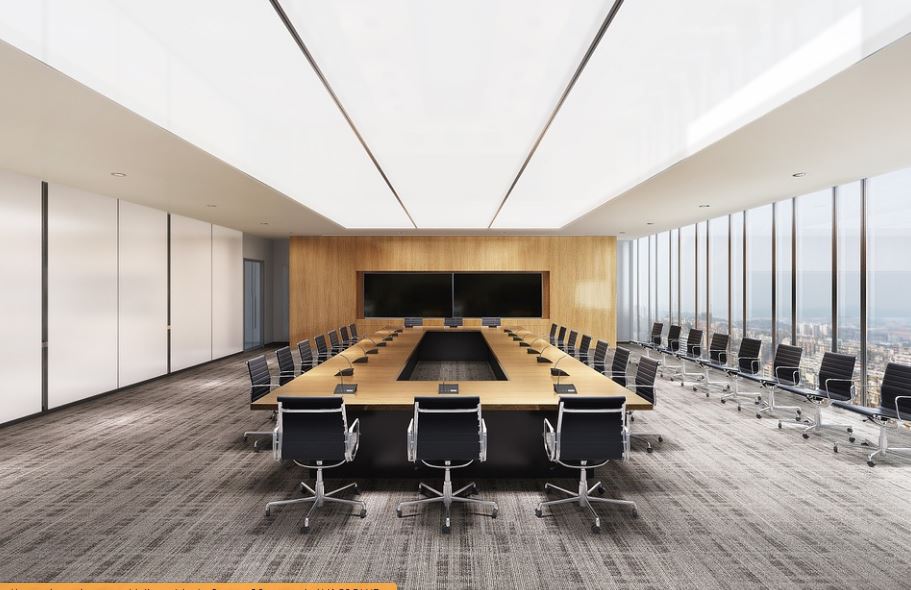A well-equipped and conveniently located place can enhance your professional image and provide top-notch amenities and expert support to ensure a successful event. Some key reasons for holding your next meeting in a reputable venue are beneficial. The following are the most popular reasons.
Professional Image: A reputable venue conveys a professional image and can help establish credibility with attendees.
Amenities: they often offer top-notch amenities such as audiovisual equipment, high-speed internet, and on-site catering.
Convenient Location: Venues in prime locations such as The Venue Alexandria are often more accessible and convenient for attendees, improving attendance and reducing travel costs.
Types of Meeting Spaces
- Conference Centers: Large facilities equipped with conference rooms, break-out spaces, and other amenities to accommodate business meetings, conferences, and events.
- Boardrooms: Private, upscale meeting spaces designed explicitly for small executive meetings or presentations.
- Coworking Spaces: Shared workspaces that offer private meeting rooms and conference spaces to businesses and freelancers
- Hotel Meeting Rooms: Meeting spaces within hotels that offer professional environments, audiovisual equipment, and catering services.
- Training Rooms: Large spaces specifically designed for training sessions and workshops.
- Classrooms: Meeting spaces equipped with desks, chairs, and projectors for educational purposes.
- Banquet Halls: Large event spaces are designed to host corporate dinners, banquets, and other events.
- Outdoor Venues: Open-air spaces for outdoor events, team-building activities, and other business-related gatherings
Tips for Planning
Define Objectives: Clearly define the purpose and goals of the meeting to determine the right place and facilities needed.
Choose a Convenient place: Consider the location with attendees and accessibility for travel.
Determine Budget: Establish a budget for the meeting and compare the costs to find the best value.
Check Availability: Contact the representative to verify availability on dates and times.
Evaluate Amenities: Determine which amenities are required, such as audiovisual equipment, Wi-Fi, and catering services.
Consider Capacity: Ensure it can accommodate the expected number of attendees and has enough space for breaks, meals, and activities.
Book Early: Reserve as early as possible to secure the desired date and time and to avoid any last-minute changes.
Communicate: Maintain open communication to ensure all details are covered and the meeting smoothly.
Tips for Maximising Space Efficiency
Seating Arrangements: Choose the most appropriate seating arrangements for the type of meeting, such as theatre style, U-shape, or round tables.
Utilise Technology: Use audiovisual technology, such as projectors, to display presentations and reduce the need for hard copies.
Provide Breakout Areas: Designate specific areas for breaks and smaller group discussions to maximise the use of space.
Minimise Clutter: Avoid placing unnecessary items in the meeting space, such as excess furniture, to create more room.
Make Use of Wall Space: Utilise wall space to display posters, presentations, or other materials, freeing up floor space.
Flexible Furniture: Consider using modular or flexible furniture that can be easily reconfigured to accommodate different meeting styles.
Streamline Processes: Implement efficient processes to reduce the time and space required for setup and cleanup.
Take Advantage of Natural Light: Choose a venue with natural light, such as The Venue Alexandria, to create a more open and airy atmosphere.
Security Considerations
Confidentiality Agreement: Have attendees sign a confidentiality agreement to protect sensitive information discussed during the meeting.
Access Control: Implement strict access control measures, such as security badges or identification checks, to prevent unauthorised access to the space.
Data Protection: Ensure it has robust data protection measures, such as secure Wi-Fi networks and encrypted storage devices.
Physical Security: Consider physical security, including fire safety measures and emergency evacuation procedures.
Cybersecurity: Address potential cybersecurity threats, such as hacking or data breaches, using secure networks and devices.
Insurance Coverage: Review insurance coverage and consider purchasing additional insurance
Background Checks: Consider conducting background checks on attendees, especially when discussing sensitive information.
In conclusion, holding your next meeting in a reputable venue can bring many benefits to your business. However, it’s essential to carefully consider factors such as budget, location, and security to maximise the benefits of your meeting space. By following these tips and considering security considerations, you can ensure your next meeting is successful.
Author: Sylvia James

